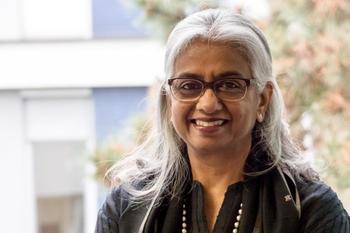Global Narratives
Media and communication scholar Radha S. Hegde, from New York University, is teaching this summer semester at Freie Universität as the Dahlem International Network Gender Studies visiting Professor.
Jun 13, 2019
Radha Hegde, a professor at New York University ’s department of Media, Culture and Communication.
Image Credit: Stefanie Hardick
Migration is a divisive and sensational topic on the world stage today. The politics of media representations of migration and the use of media by diasporic groups are both the focus of Radha Hegde’s research. A professor at New York University ’s department of Media, Culture and Communication, Hegde has been teaching and writing on issues concerning gender, media, and global migration. This summer semester, she is teaching a graduate and an undergraduate seminar on these topics at the Institute for Media and Communication Studies at Freie Universität. Collaborating with media scholar Margreth Lünenborg, professor at Freie Universität, Hegde is laying the groundwork for a global project on gender and social media activism.
Hegde’s book Mediating Migration examines how media technologies reshape both the politics and the experience of migration and national belonging. For example, she writes about food blogs as forging communities and preserving old traditions in the blurred private and public space of social media. Sporting names like “Indian Food Rocks” and “Collaborative Curry,” food blogs written by immigrants from South Asia living in the United States, Canada, or the United Arab Emirates represent new forms of global culinary networking. To Hegde, these blogs are more than just a collection of recipes, they are cultural sites where global identities are reimagined through food and the use of social media. According to Hegde, the technological sophistication of these blogs is creating networked diasporic communities actively connected to the homeland.
At Freie Universität, Hegde seminars focus on her areas of specialization – gender, globalization, and migration. In the undergraduate course “Narrating Migration,” students study how the subject of global migration is represented in various media formats and genres. “On the one hand, these narratives are changing in terms of the speed and style of reporting,” Hegde says. “On the other, old motifs and beliefs about migrants as outsiders are also aggressively resurfacing.” In class, her students analyze the language and words used to describe migrants in various domains. Her aim is to enable students to analyze the multiple layers that underlie stories about migration and situate them in their historical context.” In the end, she adds, “the goal is for students to be able to develop their own responsible narrative of migration.”
Students of media studies benefit from Hegde’s own experience in the field of journalism. After earning a degree in English literature, she worked first as a journalist for a large Indian daily newspaper, a job where she wrote features about diverse social and cultural topics. “At some point though, I wanted an opportunity to research these subjects more deeply,” she recalls. Hegde moved to the United States, where she earned a doctorate in communications, writing a dissertation about the communication networks of Indian immigrants. As a faculty member in the field of media and communication, it wasn’t long before she realized the need to expand and globalize the boundaries of her own discipline. This prompted her engagement with postcolonial and feminist theories. Her current book project is an ethnographic study of the changing role of English and the global aspirational space that it opens up for young people in India.
Sometimes, items in the newspaper will pique her analytical interest, Hegde says. For example, the subject of her inaugural lecture at Freie Universität, titled “Itinerant Data: Unveiling Gendered Scrutiny at the Border,” was inspired by a recent incident at an airport in the United States. A Muslim woman resisted unlocking her mobile phone because it contained photographs of herself without a hijab. This young woman’s objection served as a starting point for Hegde to think about broader issues concerning national belonging, the circulation of data and the boundaries between private and public. Hegde wonders if technologies of security directed at immigrants are always so neutral as we are made to believe.
At a time when borders are being debated globally, Hegde states that studying the intersections of media and migration complicates our understanding of both. Starting from the perspectives of marginalized groups gives us a different view of globalization and border. The claims from these precarious positions is a serious call for media scholars to rethink global media and digital technology. Hegde says, “To me, being a scholar is to continually think about how to ask different and more creative questions.”
This text was originally published in German in campus.leben on June 5, 2019.

